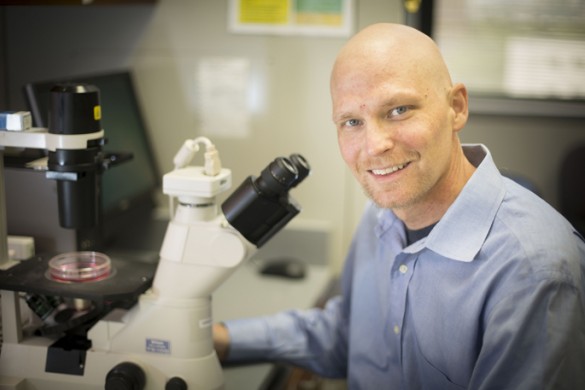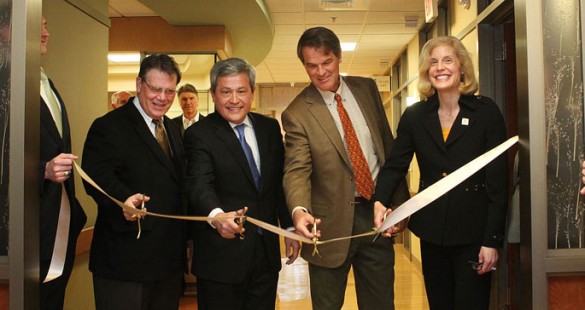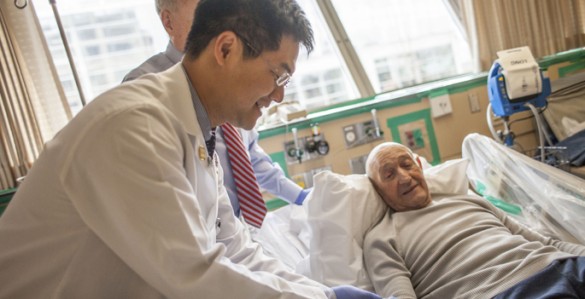
Edward (Ned) Wikle recently celebrated the Christmas holidays with his wife and three young children, a celebration the Jackson, Mississippi-based endodontist, U.S. Navy veteran and cancer patient wasn’t sure he would have.
But research by Vanderbilt-Ingram Cancer Center (VICC) investigators and the discovery of a novel gene mutation in his tumor have given him more treatment options for his rare form of lung cancer.
In November 2013, Wikle developed a persistent cough. On Christmas Eve, the athletic never-smoker discovered blood in his saliva. Within four days, a Mississippi oncologist diagnosed Wikle with advanced lung cancer that had already spread to both lungs and some lymph nodes.
He was just 33 years old.
“It was a shock, it was a shock to our family. We were three weeks before having our third child and what are we going to do?” Wikle said.
He and his family sought multiple opinions, even traveling to New York City for testing at Memorial Sloan Kettering Cancer Center, where his brother is a nurse practitioner. A friend told him about VICC’s renowned thoracic oncology program, so he met with lung cancer expert Sally York, M.D., Ph.D., assistant professor of Medicine. Initial genetic testing of the tumor found no previously described mutations for which there were therapies, so he started standard chemotherapy.
He had a good response to chemotherapy but he knew that the treatment usually stops working, so in March 2014 Wikle again contacted York.
“I was very surprised that no pathogenic mutations were discovered in such a young patient with no risk factors and felt that broader testing was indicated, that we needed to look beyond what was standard in lung cancer,” York said.
Foundation Medicine in Massachusetts sequenced the tumor and identified a novel EGFR mutation that hadn’t been detected in lung cancer, and while there are drugs approved to treat mutant EGFR lung cancer, there was no science to predict if they would work this time. So York took the findings to VICC investigator Christine Lovly, M.D., Ph.D., assistant professor of Medicine and Cancer Biology.
“It’s increasingly becoming the standard of care to do sophisticated extensive sequencing of tumors. But when new mutations are found, there has to be someone who takes it back to the laboratory to determine what the mutation means biologically, and more importantly, how the mutation may influence treatment choices,” Lovly said.
Lovly and her team labeled the mutation EGFR-KDD, for Kinase Domain Duplication.
“There are all sorts of ways that tumors can rearrange DNA. The KDD mutation takes two parts of the normal EGFR and reassembles them in an aberrant way,” Lovly said.
Jean-Nicolas Gallant, an M.D./Ph.D. student in Lovly’s lab, designed DNA and cell lines to determine if EGFR-KDD promotes tumor formation and if the cells are sensitive to approved EGFR inhibitor drugs.
The experimental work involved a multi-disciplinary team of clinicians and basic scientists in Vanderbilt’s Departments of Medicine, Cancer Biology, Chemistry, Biochemistry, as well as other institutions.
They determined that the EGFR-KDD driven cancer was likely to respond to the anti-EGFR drug afatanib. After the chemotherapy stopped working, Wikle started taking the oral medication and his coughing soon subsided.
“My breathing improved, I overall felt better. It was clear to me that I was having a really good clinical response just by the way I felt,” Wikle said.
Scans revealed his tumors had shrunk by 50 percent.
Wikle stayed on the drug for seven months with minimal side effects before his cancer started growing again.
Wikle is back on chemotherapy, which worked well the first time, while VICC investigators explore new options. They published their findings in the journal Cancer Discovery with Gallant as first author. Since publication, additional lung cancer patients with this novel mutation have been identified. Those patients now have another option for therapy.
“I’m just grateful for Dr. York, who was thinking outside the box and saying ‘we have this technology available, we should advantage of it,’ and Dr. Lovly and J.N. for their research efforts, not just for me but for other KDD patients.” Wikle said.















